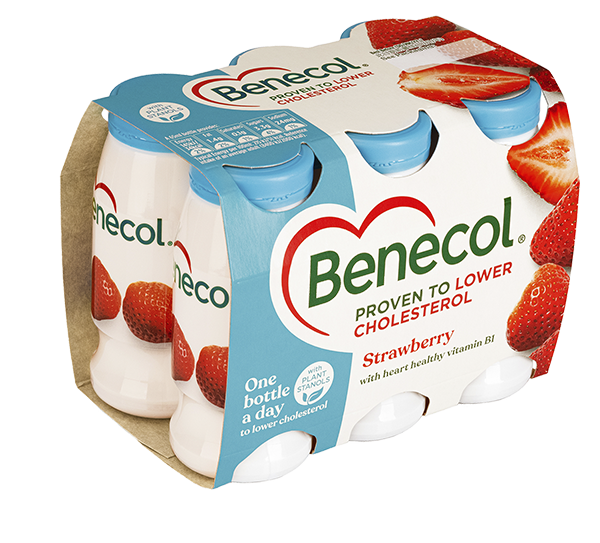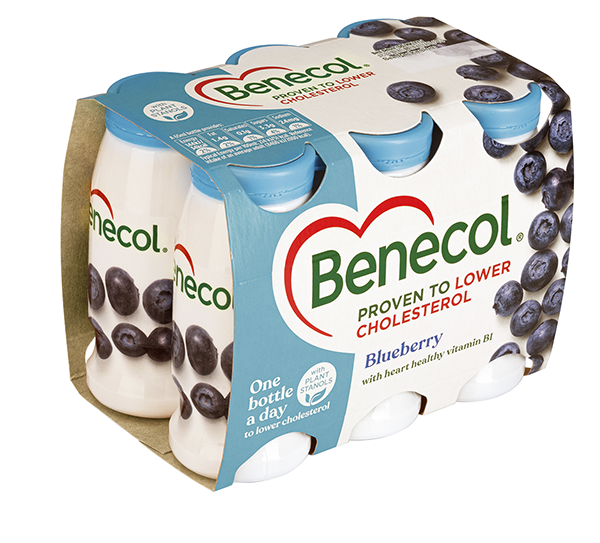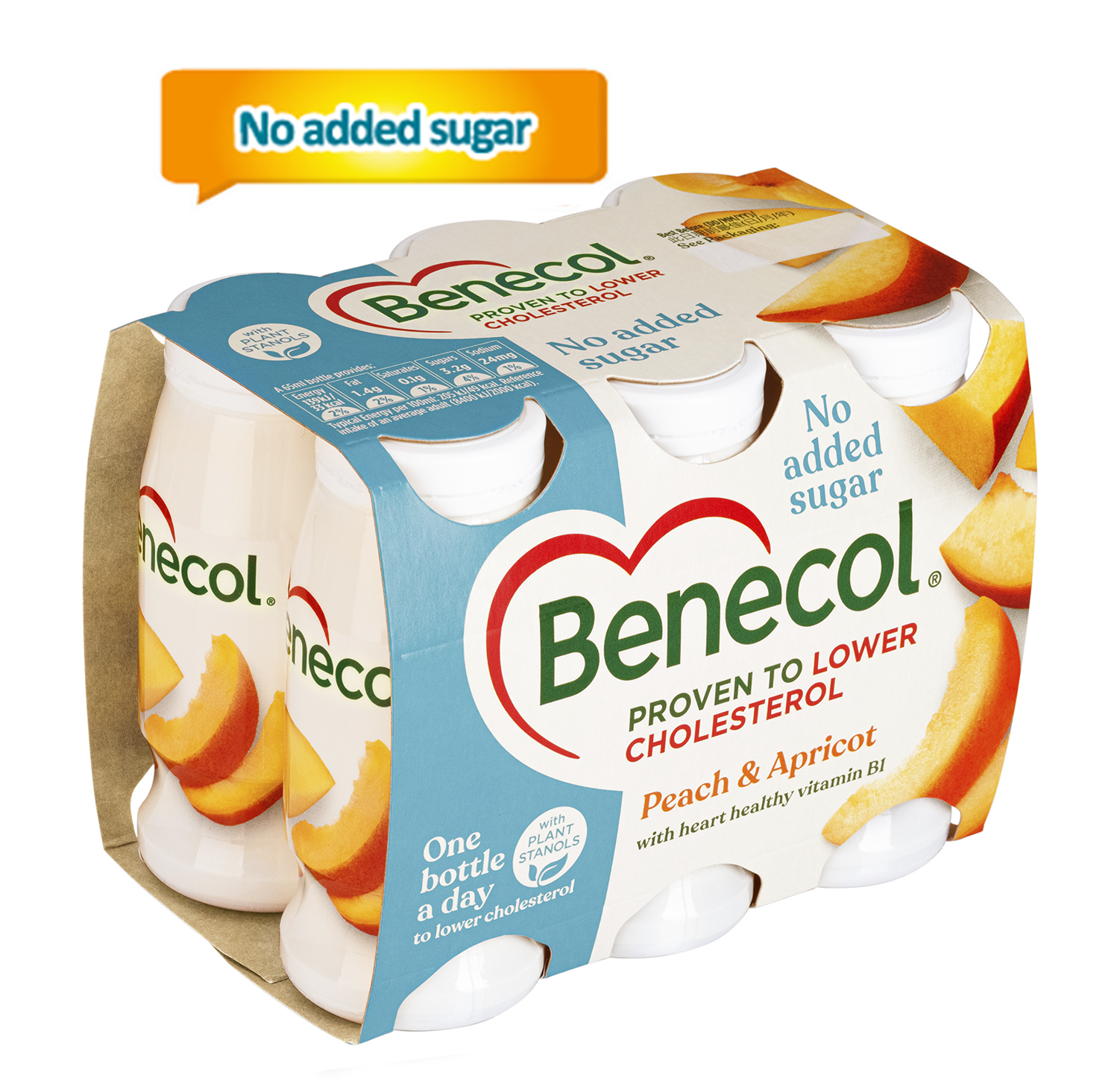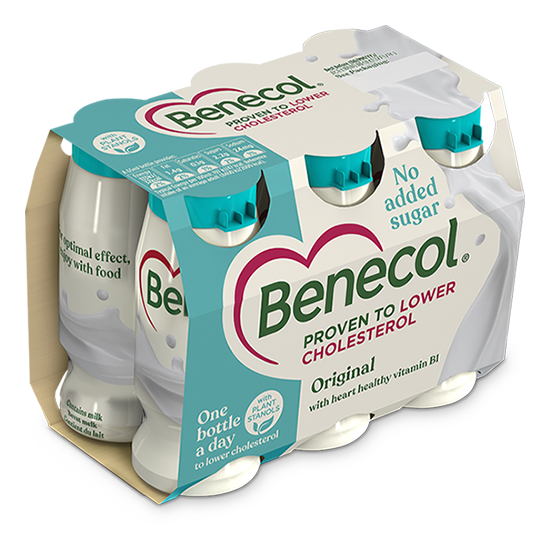Products
- Strawberry
- Blueberry
- Peach & Apricot
- Original

Strawberry
6 x 65ml bottle
Description
All Benecol yogurt drinks contain plant stanols which are clinically proven to lower cholesterol by up to 7 to 10%* in just 3 weeks. Enjoy just one bottle a day to lower cholesterol. You may take Benecol yogurt drink as part of your daily diet and to be consumed with a meal. Each bottle also contains an extra boost of heart-healthy vitamin B1^ which is shown to help heart function.
Ingredients
Yogurt (85%) (skimmed milk, yogurt cultures), Strawberry juice from concentrate (7%), Plant Stanol Ester (plant stanols 3%), Sugar, Lemon juice concentrates, Stabiliser (pectin), Colour (beetroot juice from concentrate), Flavouring, Sweetener (sucralose), Vitamin B1, Preservative (potassium sorbate)
|
^Vitamin B1 contributes to the normal function of the heart.
Check with your doctor if you are taking cholesterol lowering medication. Benecol foods may not be nutritionally appropriate for pregnant or breast feeding women and children under five.
*The EFSA Journal(2008)825, 1-13. Plant stanol ester and blood cholesterol.
The EFSA Journal(2009)1175, 1-9. Plant Stanols and Plant Sterols and Blood LDL-Cholesterol.
| Nutrition information | Per 100ml | Per bottle (65ml) |
|---|---|---|---|
| Energy | 219 kJ/52 kcal | 148 kJ/35 kcal | |
| Fat of which saturates Trans fats | 2.1 g 0.2 g 0 g | 1.4 g 0.1 g 0 g | |
| Carbohydrate of which sugars | 4.9 g 4.8 g | 3.3 g 3.2 g | |
| Protein | 2.8 g | 1.9 g | |
| Sodium | 36 mg | 24 mg | |
| Vitamin B1 | 0.51 mg (46% RI) | 0.34 mg (31% RI) | |
| Plant Stanols | 3.0 g | 2.0 g |

Blueberry
6 x 65ml bottle
Description
All Benecol yogurt drinks contain plant stanols which are clinically proven to lower cholesterol by up to 7 to 10%* in just 3 weeks. Enjoy just one bottle a day to lower cholesterol. You may take Benecol yogurt drink as part of your daily diet and to be consumed with a meal. Each bottle also contains an extra boost of heart-healthy vitamin B1^ which is shown to help heart function.
Ingredients
Yogurt (85%) (skimmed milk, yogurt cultures), Water, Plant Stanol Ester (plant stanols 3%), Blueberry puree (1.8%), Sugar, Lemon juice concentrates, Stabiliser (pectin), Flavouring, Sweetener (sucralose), Vitamin B1, Preservative (potassium sorbate)
|
^Vitamin B1 contributes to the normal function of the heart.
Check with your doctor if you are taking cholesterol lowering medication. Benecol foods may not be nutritionally appropriate for pregnant or breast feeding women and children under five.
*The EFSA Journal(2008)825, 1-13. Plant stanol ester and blood cholesterol.
The EFSA Journal(2009)1175, 1-9. Plant Stanols and Plant Sterols and Blood LDL-Cholesterol.
| Nutrition information | Per 100ml | Per bottle (65ml) |
|---|---|---|---|
| Energy | 219 kJ/52 kcal | 148 kJ/35 kcal | |
| Fat of which saturates Trans fats | 2.1 g 0.2 g 0 g | 1.4 g 0.1 g 0 g | |
| Carbohydrate of which sugars | 4.9 g 4.7 g | 3.3 g 3.2 g | |
| Protein | 2.8 g | 1.9 g | |
| Sodium | 36 mg | 24 mg | |
| Vitamin B1 | 0.51 mg (46% RI) | 0.34 mg (31% RI) | |
| Plant Stanols | 3.0 g | 2.0 g |

Peach & Apricot
6 x 65ml bottle
Description
All Benecol yogurt drinks contain plant stanols which are clinically proven to lower cholesterol by up to 7 to 10%* in just 3 weeks. Enjoy just one bottle a day to lower cholesterol. You may take Benecol yogurt drink as part of your daily diet and to be consumed with a meal. Each bottle also contains an extra boost of heart-healthy vitamin B1^ which is shown to help heart function.
Ingredients
Yogurt (85%) (skimmed milk, yogurt cultures), Plant Stanol Ester (plant stanols 3%), Peach pulp (2%), Apricot pulp (2%), Apple puree, Lemon juice, Stabiliser (pectin), Flavourings, Colour (beta-carotene), Sweetener (sucralose), Vitamin B1, Preservative (potassium sorbate)
|
^Vitamin B1 contributes to the normal function of the heart.
Check with your doctor if you are taking cholesterol lowering medication. Benecol foods may not be nutritionally appropriate for pregnant or breast feeding women and children under five.
*The EFSA Journal(2008)825, 1-13. Plant stanol ester and blood cholesterol.
The EFSA Journal(2009)1175, 1-9. Plant Stanols and Plant Sterols and Blood LDL-Cholesterol.
| Nutrition information | Per 100ml | Per bottle (65ml) |
|---|---|---|---|
| Energy | 205 kJ/49 kcal | 139 kJ/33 kcal | |
| Fat of which saturates Trans fats | 2.0 g 0.2 g 0 g | 1.4 g 0.1 g 0 g | |
| Carbohydrate of which sugars | 4.8 g 4.7 g | 3.2 g 3.2 g | |
| Protein | 2.9 g | 1.9 g | |
| Sodium | 36 mg | 24 mg | |
| Vitamin B1 | 0.51 mg (46% RI) | 0.33 mg (31% RI) | |
| Plant Stanols | 3.0 g | 2.0 g |

Original
6 x 65ml bottle
Description
All Benecol yogurt drinks contain plant stanols which are clinically proven to lower cholesterol by up to 7 to 10%* in just 3 weeks. Enjoy just one bottle a day to lower cholesterol. You may take Benecol yogurt drink as part of your daily diet and to be consumed with a meal. Each bottle also contains an extra boost of heart-healthy vitamin B1^ which is shown to help heart function.
Ingredients
Yogurt (85%) (skimmed milk, yogurt cultures), Water, Plant Stanol Ester (plant stanol 3%) Stabiliser (pectin), Lemon juice concentrate, Sweetener (sucralose), Vitamin B1*, Preservative (benzoic acid)
|
^Vitamin B1 contributes to the normal function of the heart.
Check with your doctor if you are taking cholesterol lowering medication. Benecol foods may not be nutritionally appropriate for pregnant or breast feeding women and children under five.
*The EFSA Journal(2008)825, 1-13. Plant stanol ester and blood cholesterol.
The EFSA Journal(2009)1175, 1-9. Plant Stanols and Plant Sterols and Blood LDL-Cholesterol.
| Nutrition information | Per 100ml | Per bottle (65ml) |
|---|---|---|---|
| Energy | 197 kJ/47 kcal | 133 kJ/32 kcal | |
| Fat of which saturates Trans fats | 2.1 g 0.2 g 0 g | 1.4 g 0.1 g 0 g | |
| Carbohydrate of which sugars | 3.6 g 3.3 g | 2.4 g 2.2 g | |
| Protein | 2.8 g | 1.9 g | |
| Sodium | 36 mg | 24 mg | |
| Vitamin B1 | 0.51 mg (46% RI) | 0.34 mg (31% RI) | |
| Plant Stanols | 3.0 g | 2.0 g |
RI = Reference Intake














































